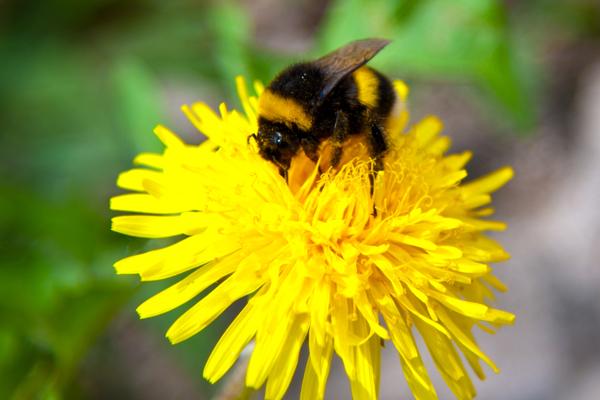Garden centres selling 'bee-friendly' plants laced with pesticides that harm them, study finds
Just two of the 29 plants tested contained no insecticide or fungicide

Garden centres and other retailers are selling supposedly ‘bee-friendly’ plants that contain high levels of dangerous insecticides, according to a new study.
Researchers bought 29 such flowers from five different companies, four major retailers and one local nursery.
They found all but two were contaminated with pesticides or fungicides and more than 70 per cent contained the controversial neonicotinoid chemicals which have been shown to cause significant harm to bees.
Writing in paper to be published in the journal Environmental Pollution, academics from Sussex and Padova universities said: “Garden centres frequently market nectar and pollen-rich ornamental plants as ‘pollinator-friendly’.
“However these plants are often treated with pesticides during their production. There is little information on the nature of pesticide residues present at the point of purchase and whether these plants may actually pose a threat to, rather than benefit, the health of pollinating insects.
“This study screened leaves from 29 different ‘bee-friendly’ plants for eight insecticides and 16 fungicides commonly used in ornamental production.
“Only two plants (a Narcissus and a Salvia variety) did not contain any pesticide and 23 plants contained more than one pesticide, with some species containing mixtures of seven (Ageratum houstonianum) and 10 (Erica carnea) different agrochemicals.”

Neonicotinoids were presented in levels “that overlap with those known to cause harm to bees”.
“The net effect on pollinators of buying plants that are a rich source of forage for them but simultaneously risk exposing them to a cocktail of pesticides is not clear,” the researchers said.
But they added: “Gardeners who wish to gain the benefits without the risks should seek uncontaminated plants by growing their own from seed, plant-swapping or by buying plants from an organic nursery.”
The major plant retailers sampled were B&Q, Aldi, Homebase and Wyevale.
B&Q said in a statement: “All our plant ranges are grown in line with current regulations. The research referenced was carried out last year.
“We announced in April 2017 that our flowering plant range, available from February 2018, will be grown free from all nine neonicotinoid pesticides.
“This move means B&Q is the first to commit to ensuring no neonicotinoid pesticides are used in the cultivation of flowering plants, particularly pollinators where they present the biggest risk of harm to bees.”
The two plants that contained no pesticides or fungicides were a ‘tete-a-tete’ daffodil, Narcissus jonquilla, sold by Wyevale, and a ‘sensation deep rose’, Salvia nemerosa, sold by Homebase.
An Aldi spokesperson said in a statement: “Since October 2016, Aldi has not sold any bedding plants with neonicotinoids.
“In addition, we have never sold any plants under the RHS [Royal Horticultural Society] Perfect for Pollinators programme.”
Homebase and Wyevale could not be reached for comment.
Phil Cottingham, co-owner of the family-run nursery, Staverton, in East Sussex, said they did not market their home-grown plants as good for pollinators, but would sell plants from other suppliers that did make this claim.
Mr Cottingham said: “I can see where they [the academics] are coming from … up to know we haven’t questioned these things … we haven’t really followed it up with our suppliers, but I can certainly see the sense in it.”
He said the nursery tried to use as little chemicals as possible, but said it would be difficult to grow roses free of black spot without a fungicide.
“We try in our home-grown stuff to keep the insecticides down to an absolute minimum. That’s the way the industry is going,” he said.
“We’d struggle to do it without [any] pesticides but with neonicotinoids I can see the sense in saying we cannot have these.”
Join our commenting forum
Join thought-provoking conversations, follow other Independent readers and see their replies
Comments
Bookmark popover
Removed from bookmarks